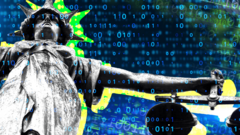Could You Cash in on the $50M Reward for Arresting Nicolás Maduro?

The Escalating Pressure on Nicolás Maduro: A $50 Million Bounty and Its Implications
The United States has significantly increased the stakes in its ongoing pursuit of Venezuelan President Nicolás Maduro by doubling the reward for information leading to his arrest to an astonishing $50 million. This move comes amidst serious allegations against Maduro, branding him as one of the largest narco-traffickers globally. The implications of this bounty extend far beyond mere financial incentives; they signal a deepening rift between the US and the Venezuelan government, reflecting a broader geopolitical tension that has been escalating for years.
The Context of the Reward Increase
In a climate where international relations are fraught with complexity, the US government's decision to double the reward from $25 million to $50 million is particularly notable. Attorney General Pam Bondi has articulated that Maduro's alleged direct involvement in drug smuggling operations warrants this drastic increase. The accusations are not unfounded; the US has long maintained that Maduro collaborates with notorious criminal organizations, further complicating the humanitarian crisis currently gripping Venezuela.
Allegations of Narco-Trafficking
President Trump, a vocal critic of Maduro, has previously accused him of engaging in narco-terrorism and drug trafficking. The US Department of Justice has charged Maduro and several high-ranking officials with offenses that include corruption and drug trafficking. The allegations suggest a coordinated effort with Colombian rebel groups, particularly the Farc, to use cocaine as a tool to "flood" the United States.
Connections to Criminal Organizations
During a recent press briefing, Attorney General Bondi underscored Maduro's supposed coordination with groups like Tren de Aragua, a Venezuelan gang labeled a terrorist organization by the Trump administration, and the infamous Sinaloa Cartel, a major player in the global drug trade. The Drug Enforcement Administration (DEA) has linked Maduro and his associates to the seizure of 30 tons of cocaine, with nearly seven tons directly tied to Maduro himself. Such claims paint a grim picture of the Venezuelan leadership's involvement in international drug trafficking.
Maduro's Response and Political Landscape
Despite the mounting accusations, Maduro has consistently refuted the claims of his involvement in drug trafficking. The Venezuelan government has been largely silent in response to Bondi's remarks, but Maduro's history suggests a pattern of denial against any allegations that threaten his regime. His administration has been accused of severe repression against opposition groups, utilizing violence and intimidation to maintain power.
Political Ramifications of the Bounty
The US's renewed appeal and the increased cash incentive for information about Maduro's whereabouts could have far-reaching political ramifications. The Venezuelan political landscape has been volatile, particularly following last year's contested election marred by allegations of vote-rigging. Maduro's ability to maintain power amidst widespread protests and international condemnation speaks volumes about the internal and external challenges he faces.
The Role of Former Officials
Adding another layer of complexity to this political drama is the case of Hugo Carvajal, a former military intelligence chief in Venezuela. Carvajal, who has been described as a feared spymaster, was recently convicted of drug trafficking charges after being arrested in Madrid. His shift from denial to guilty plea has sparked speculation that he may have cut a deal with US authorities, potentially providing incriminating information about Maduro in exchange for a more lenient sentence.
International Sanctions and Isolation
The UK and EU have also taken steps to impose sanctions against Maduro's government, further isolating Venezuela on the international stage. These sanctions reflect a broader consensus among Western nations regarding the need to hold Maduro accountable for his actions and the deteriorating conditions within Venezuela. The combination of domestic repression and external pressure paints a troubling picture for the future of the Venezuelan government.
Understanding the Humanitarian Crisis
While the political maneuvers and allegations of narco-trafficking make headlines, it is essential not to lose sight of the humanitarian crisis unfolding in Venezuela. The country faces severe shortages of food, medicine, and basic services, leading to a mass exodus of Venezuelans seeking better lives abroad. The political turmoil has exacerbated these issues, creating a cycle of suffering that affects millions.
The Impact on Venezuelan Citizens
Venezuelan citizens are caught in a web of economic collapse and political instability. The inflation rate has skyrocketed, rendering the local currency nearly worthless. Many families struggle to afford basic necessities, while the healthcare system has crumbled under the weight of mismanagement and lack of resources. The daily plight of the Venezuelan people serves as a stark reminder of the consequences of a government's failure to prioritize its citizens' welfare.
What Lies Ahead?
The future of Nicolás Maduro's regime remains uncertain. The US's increased bounty, coupled with international sanctions and internal dissent, raises questions about how long he can hold onto power. The geopolitical dynamics surrounding Venezuela are complex, and the interplay between domestic issues and international pressures will continue to shape the nation's trajectory.
The Role of International Relations
As the US intensifies its efforts to bring Maduro to justice, the response from other nations will be critical. Countries that have historically supported Maduro may reassess their positions, especially if the political winds change. The potential for a shift in alliances could further isolate Maduro and his government, making it increasingly difficult for them to navigate the current political landscape.
Conclusion: A Call for Change
The doubling of the reward for information leading to Nicolás Maduro's arrest is a significant development in the ongoing saga of Venezuelan politics. It serves as a reminder of the broader implications of drug trafficking and corruption on governance and the welfare of citizens. As the situation unfolds, it is crucial to keep the focus on the humanitarian crisis at hand and the need for a resolution that prioritizes the well-being of the Venezuelan people.
FAQs about Nicolás Maduro and the Current Situation in Venezuela
What led to the increase in the reward for Nicolás Maduro's arrest?
The US government doubled the reward to $50 million due to allegations linking Maduro to substantial drug trafficking operations and his purported coordination with criminal organizations.
How has the Venezuelan government responded to these accusations?
While Maduro has denied involvement in drug trafficking, the Venezuelan government has not publicly responded to the recent remarks made by the US Attorney General.
What are the implications of Hugo Carvajal's guilty plea?
Carvajal's plea raises speculation that he may have provided incriminating information about Maduro in exchange for a reduced sentence, potentially affecting the political landscape in Venezuela.
What is the current humanitarian situation in Venezuela?
The humanitarian crisis in Venezuela is dire, characterized by severe shortages of food, medicine, and essential services, leading to widespread suffering among the populace.
As the US and international community continue to pressure Maduro's regime, the question remains: how will the Venezuelan people navigate this turbulent landscape in pursuit of a better future? #Venezuela #NicolasMaduro #HumanRights
Published: 2025-08-08 01:49:08 | Category: technology



